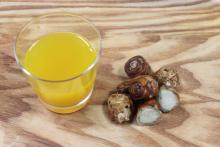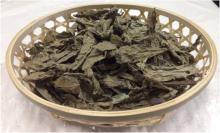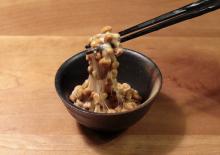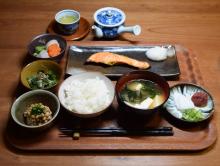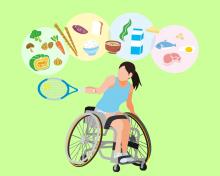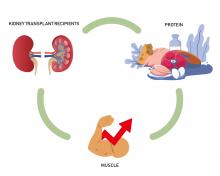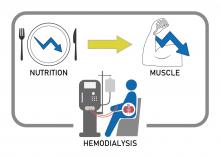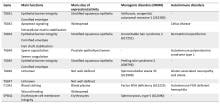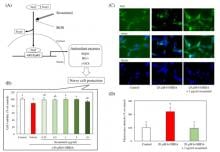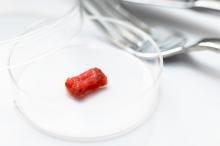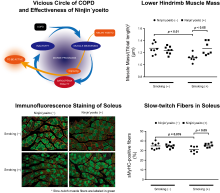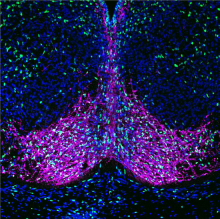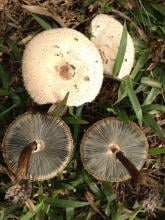Medicine & Healthcare Nutrition
News
25 Aug 2023
Osaka Metropolitan University scientists have verified the anticancer effects of Kencur, a tropical plant of the ginger family, mainly grown in Southeast Asia, in cell and animal experiments. They found that Kencur extract and its main active components significantly inhibit cancer cell growth at the cellular and animal levels. Furthermore, the involvement of TFAM in the mechanism of action was confirmed.
04 Aug 2023
Osaka Metropolitan University scientists tested the antiobesity effects of Mallotus furetianus extract native to Hainan Island, China, using obesity model mice. As a result, body weight and adipose tissue weight of obesity model mice were significantly reduced by the intake of Mallotus furetianus extract. Fatty liver was suppressed and adipocyte size reduction in adipose tissue was observed. Further investigation into the mechanism revealed that fat synthesis is inhibited by suppressing the expression of several transcription factors involved in differentiation into adipocytes.
19 Jul 2023
A joint research group at Osaka Metropolitan University conducted a survey on prevalence of obesity and factors associated with low obesity among 423 adolescents between the ages of 14 and 19 living in Harare, Zimbabwe. The results revealed that 15.8% were obese or overweight. The study also revealed that 27.1% of the participants had low obesity awareness, which was significantly related to parents/guardians' lack of formal education and insufficient knowledge about eating habits.
25 May 2023
Eating fermented foods might be the secret to a healthy and long-lived society
25 Apr 2023
A research group at the Osaka Metropolitan University analyzed the relationship between diet, muscle mass, and liver fibrosis progression in 136 patients with nonalcoholic fatty liver disease attending the Osaka Metropolitan University Hospital. The research group found that the group with the highest Japanese diet score had less advanced liver fibrosis, and that the intake of soy products, seafood, and seaweed was important.
20 Oct 2022
Osaka Metropolitan University researchers interviewed active para-athletes with lower-limb disabilities who compete at an international level, about diet and nutrition. The research team found that what para-athletes considered an ideal diet was not necessarily optimized for improving athletic performance, and even when para-athletes understood diets geared towards athletic performance, characteristics of their disabilities impose barriers to implementing dietary changes. Understanding these concerns and struggles is important for nutritionists who support para-athletes in sports nutrition.
15 Sep 2022
It is commonly believed that patients with chronic kidney disease should limit their protein intake given that excessive protein worsens kidney function. However, a new study by Osaka Metropolitan University scientists indicates that changes in skeletal muscle mass are positively correlated with protein intake, suggesting the necessity of adequate protein intake to improve muscle mass after kidney transplantation.
15 Jul 2022
Fresh vegetables in vinegar, similar to pickles, are a perfect side dish, commonly served with Japanese cooking. One traditional side dish called sunomono, a cool cucumber or seaweed salad, provided a unique opportunity as a source of dietary vinegar. This new observational study from Osaka Metropolitan University noted that men over 40 who eat sunomono at least once a month were significantly more likely to be in lower blood pressure categories.
01 Jun 2022
Scientists at Osaka Metropolitan University utilized a Japan-developed, objective, and simple nutritional indicator called the Nutrition Risk Index (NRI) to unveil a long-suspected yet unverified relationship between sarcopenia and malnutrition in end-stage kidney disease patients. Their findings confirmed that malnutrition contributes to sarcopenia, which can be detected through NRI.
18 Apr 2022
In line with globally recommended practices to reduce the dietary risk of non-communicable diseases (NCDs), the Sri Lankan government implemented a traffic-light labelling (TLL) system for sugar-sweetened beverages (SSB) in August 2016. The purpose of the regulations was to educate the public on the sugar content in SSBs to promote healthy diets in Sri Lanka and reduce NCDs associated with a high sugar intake. It is timely to assess the effectiveness of TLL in encouraging healthier food choices. Based on an ongoing IPS study, this blog discusses consumers’ knowledge of TLL and how it impacts their SSB choices.
23 Dec 2021
By searching for the protein transglutaminase 1 (TGM1) among patients with various autoimmune skin diseases, researchers have successfully identified a separate disease that
can be linked to autoimmunity against TGM1. This backward method
demonstrates a new way of identifying autoantigens as markers for various
diseases. By letting autoantigens point to the disease, diagnosis and
treatment can be facilitated, according to the study now published in PNAS.
25 Oct 2021
Researchers have revealed in an animal model that ImmuBalance, a fermented soybean product, is effective in suppressing airway inflammation caused by asthma. Results showed a decreased presence of eosinophils in bronchoalveolar lavage fluid, a decrease in mucus production in the bronchial epithelium, and a suppression of proteins that induce eosinophilic inflammation.
29 Sep 2021
Researchers conducted an online survey on nutrition, dietary behavior, and body image with 32 national and international level para-athletes with physical disabilities such as spinal cord injury or limb defect/amputation. Results showed that about 40% need assistance in procuring and cooking food and that it is difficult to achieve their ideal diet on their own. Also, although para-athletes with a good body image rated their eating habits as healthy, they had a low percentage of correct answers to questions about nutrition.
04 Jun 2021
Researchers from Osaka City University find that when the larva nematode C. elegans is fed a diet of Bacillus subtilis var. natto, a bacteria used to ferment soy beans into the traditional Japanese food natto, upon reaching adulthood these worms are able to survive infections from the gram-positive bacteria Staphylococcus aureus and Enterococcus faecalis longer than when fed a standard diet of non-pathogenic E. coli.
03 Mar 2021
Osaka City University finds that the chemical sesaminol, naturally occurring in sesame seeds, protects against Parkinson’s disease by preventing neuronal damage that decreases the production of dopamine. In vitro experiments show sesaminol handle oxidative stress in cells by regulating the production of reactive oxygen species and the movement of antioxidants. In vivo experiments reveal that a diet of sesaminol increases production of dopamine and significantly improve motor functions in mice.
02 Mar 2021
Researchers at The University of Tokyo develop a method of culturing meat in the laboratory in the form of millimeter-scale contractile beef muscle that closely simulates steak meat
26 Feb 2021
Vitamin B6 may help calm cytokine storms and unclog blood clots linked to COVID-19's lethality. But research on it is lacking. A Hiroshima University researcher calls on fellow scientists to study its potential role.
08 Jan 2021
Researchers led by the University of Tsukuba find that drinking two cups of oolong tea a day can stimulate fat breakdown while you sleep.
30 Nov 2020
Osaka City University shows carrot-based Japanese herbal medicine “Ninjin’yoeito” helps recover muscle fibers in mice.
13 Nov 2020
A Singapore study finds patients with chronic kidney disease need tailored nutrition guidance, as well as better communication with doctors and family support, to empower them to manage their condition.
22 Oct 2020
Asia-Pacific Agri-Food Innovation Summit, November 18-20, VIRTUAL - from 2.30pm SGT
04 Sep 2020
Pregnant mice fed diets high in omega-6 fats and low in omega-3 fats are shown in a new study to produce offspring whose brains had a higher level of dopamine-producing neurons—the neurological reward system. These mice went on to chase hyper-caloric diets, suggesting that the fats in a pregnant mother's diet may control the eating habits of her children, and potentially offering a new obesity-prevention strategy.
17 Dec 2018
Major study of 7,663 Malaysian women shows that breastfeeding, physical activity and soy intake are protective against breast cancer. The findings were from the Malaysian Breast Cancer (MyBrCA) genetic study and the Malaysian Mammographic Density (MyMammo) study.
17 Dec 2018
Chlorophyllum molybdites is the poisonous mushroom most frequently reported in Malaysia. The mushroom is confused with Termitomyces mushroom, the edible type. Researchers worked with clinicians and provide training for the doctors about the study of fungus, clinical management of mushroom poisoning and mushroom toxicology surveillance system.
21 Jun 2017
Professor Terrence Forrester, an expert in childhood malnutrition, warns that the first 1,000 days are among the most important in children’s lives, and more needs to be done to ensure that they get optimal nutrition during this critical period.
Events
18 Nov 2020 to 20 Nov 2020
The Asia-Pacific Agri-Food Innovation Summit will focus on accelerating innovation in supply chain resilience, urban food systems, alternative proteins, and affordable nutrition. Will you be joining the conversation virtually on November 18-20?
Researchers
Dr Kanimolli Arasu is a lecturer and a dietitian at the International Medical University, Malaysia.
Takashi Hashimoto's major expertise is clinical and basic research for both autoimmune bullous diseases and hereditary skin diseases.
Dr. Louisa Chung is a Registered Nutritionist of Association for Nutrition (UK) with ten years experience in weight management and physical fitness projects. She is now working on an innovative dietary intake method which aims better result in weight loss and nutrition education.
Giants in history
Umetaro Suzuki (7 April 1874 – 20 September 1943) was a Japanese scientist best remembered for his research on beriberi, a disease caused by vitamin B1 deficiency, characterized by limb stiffness, paralysis and pain.


